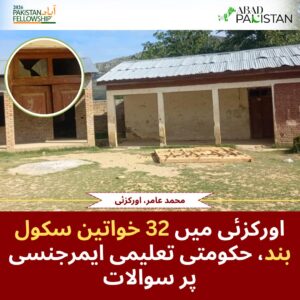Sexual violence in Pakistan remains a major problem. Because alarming statistics reveal the widespread nature of the problem. According to the annual report of the Human Rights Commission of Pakistan, in 2023 there were 4,213 reported cases of child abuse, an average of 11 cases per day. These numbers are extremely worrying and reflect serious human rights violations against children and adults.
The challenge of sexual violence in Pakistan is compounded by the country’s low conviction rate in rape cases. Estimated at less than 3%, this deeply worrying statistic indicates the difficulty of prosecuting perpetrators and providing justice for victims. These issues were discussed extensively in the Human Rights Watch World Report 2024 in Pakistan, which highlighted the urgent need for effective legal and institutional reform to address sexual violence.
In response to this crisis The Government of Pakistan has taken a step forward by requiring the establishment of Anti-Rape Crisis Cells (ARCCs) in all district hospitals under the Anti-Rape Trial and Investigation Act of 2021.
The ARCCs, as outlined in the Act, are to be in public hospitals, where they will be supervised by medical superintendents, and are expected to work closely with local law enforcement and legal teams. The goal is to bring in key responders such as medical and legal officials. police officer and LAS Lawyer come together in one place to make it easier for survivors to access essential services. More importantly This act ensures that at least one team member is in dealing with such delicate cases… Recognize the need for a gender sensitive approach.
These crisis cells will be critical in improving the response to sexual violence in terms of medical treatment and legal support. By ensuring that medical, legal and police services are well coordinated, ARCC aims to reduce the trauma of survivors who come to this canter
The Legal Aid Society, in collaboration with the United Nations Population Fund (UNFPA), is working with the federal and provincial governments to strengthen the implementation of sexual and gender-based violence (SGBV) laws, including the Anti-Rape trial and investigation Act of 2021.
Through initiatives such as training first responders and creating a clear referral network, the Legal Aid Society and its partners are helping to ensure that survivors of sexual violence can access the services they need. The extensive efforts of the Legal Aid Society have successfully established canters, first in Karachi, then in Islamabad, and now in Peshawar, with the support of UNFPA and the provincial governments.
The establishment of the Anti-Rape Crisis Cell is an important step in tackling the widespread problem of sexual violence in Pakistan. These cells will provide a one-stop centre for medical, legal and police support to ensure their rights are upheld. And there are places that provide support in accessing justice.
The establishment of the Anti-Rape Crisis Cell (ARCC) is an important step in the fight against sexual violence in Pakistan. by coordinating medical, legal, and police assistance to survivors These cells help reduce victim injury and increase access to justice. Legal Aid Society’s efforts to strengthen implementation of anti-rape laws also contribute to creating a more supportive and responsive system. Together, these initiatives are critical to ensuring a gender-sensitive and effective response to sexual violence in Pakistan.






